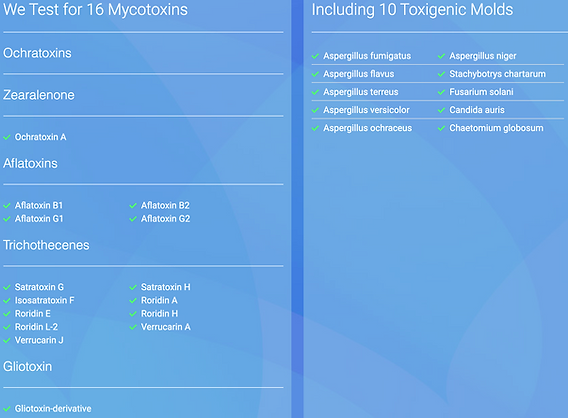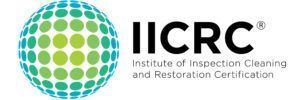Mycotoxin Testing from Certified Indoor Air Inc
Mycotoxins are secondary metabolites produced by various mold species as a toxic defense mechanism to protect their food source and territory. They can become a severe threat to the health of humans and animals. These toxins can be breathed into the body or absorbed by the body. Mycotoxins can then accummulate in the body and play havoc with one's immune system.
Common Types of Mycotoxins
- AFLATOXIN M1 (AFM1)
- OCHRATOXIN A (OTA)
- STERIGMATOCYSTIN (STG)
- RORIDIN E
- VERRUCARIN A
- ENNIATIN B
- ZEARALENONE (ZEA)
- GLIOTOXIN*
- MYCOPHENOLIC ACID*
- DIHYDROCITRINONE*
- CHAETOGLOBOSIN A*
What is Mycotoxin Testing?
Mycotoxins are dangerous chemicals produced by mold. Mycotoxins are separate from the spores molds produce for reproduction. However, these chemicals can become airborne and travel with mold spores. Researchers have demonstrated that mycotoxins also travel through the air on very small particles of dust, which can easily be inhaled Different species of toxic molds produce different mycotoxins. Mycotoxin testing is a type of analytical testing used to detect and measure the presence of mycotoxins in your building.
Why Choose Mycotoxin Testing?
Mycotoxins have low molecular weight and thermostability. As a result, they do not degrade easily. They can remain present even after the mold has been removed from the environment. Because they are chemicals, they are not alive and, therefore, cannot be "killed." Instead, mycotoxins must be carefully removed from your environment using specific cleaning protocols.
Certified Indoor Air Inc Mycotoxin Testing Procedure and Reporting
Dust samples are collected from your home to send to a laboratory for identification. The test we use is called EMMA (Environmental Mold & Mycotoxin Assessment). It uses molecular detection technology to look for the presence of the ten most toxigenic molds and the 16 most poisonous mycotoxins associated with them.
This test will determine if four specific groups of mycotoxins are present - Trichothecenes, Gliotoxins, Aflatoxins, Ochratoxin A, and Zearalenone.
View a Sample Report

Get the professionals to help, call (919) 214-5000 now!
Our Service Areas
Apex, Cary, Chapel Hill, Clayton, Durham, Fuquay-Varina, Garner, Holly Springs, Knightdale, Morrisville, Pittsboro, Raleigh, Rolesville, Wake Forest, Wendell, Willow Spring
Phone: (919) 214-5000 | Email: wtdolch@gmail.com
Available 24/7













